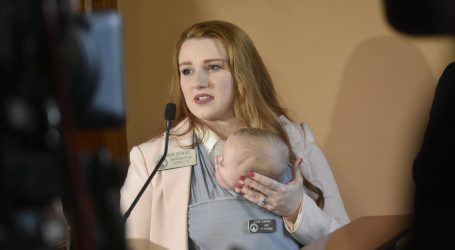Kasim Reed endorses Tom Perez in race for DNC chair
Over four days this month, Atlanta will become ground zero for Democrats pondering their future in the Age of Trump.
The climax of the Feb. 23-26 meeting of the Democratic National Committee will be the election of a chairman to replace Donna Brazile – herself a temporary fix left over from the 2016 presidential race.
One of those with a vote will be Atlanta Mayor Kasim Reed, who this morning endorsed former labor secretary Tom Perez for the job:
“Tom understands the critical issues facing Democrats in their fight against a dangerous Republican agenda that has endangered American voting rights and pursued discriminatory legislative redistricting which leaves many citizens without an equal voice in their government…
“Under Tom’s leadership, the Democratic Party has the opportunity to demonstrate how all Americans can be a part of the 21st century economy, and how we are at our best when we choose diversity over division.”
They do not agree on very much any more, but last month, former Atlanta mayor Shirley Franklin endorsed Perez as well. As has former vice president Joe Biden.
The fight over DNC chair could resemble last year’s the bruising presidential primary, where an establishment-backed Hillary Clinton squared off against Vermont Sen. Bernie Sanders’ insurgent campaign.
This time, Sanders and other progressive powerbrokers – among them U.S. Rep. John Lewis of Atlanta — are backing U.S. Rep. Keith Ellison’s bid for DNC chair, while Perez has support from President Barack Obama’s allies.
Other contenders in the race include Jamie Harrison, the head of the South Carolina Democratic Party, and Sally Boynton Brown of the Idaho Democratic Party.
Perez has centered his campaign on a promise to combat voter suppression efforts and hiring an in-house cyber security chief to prevent another hacking attack.
Perez has a slight family connection to Atlanta. His father, a Dominican immigrant, was a doctor in Atlanta before moving to Buffalo, N.Y., where the candidate for DNC chair was born.
***
Thanks to Elizabeth Warren, D-Mass., we are all now familiar with Rule 19, which bars U.S. senators from speaking ill of each other while on the chamber floor. But where did that rule come from? Credit South Carolina, says The State newspaper in Columbia, S.C.:
The rule was put in place in 1902 after a fistfight broke out in the Senate chamber between the two men representing the Palmetto State.
After years of souring relations between the two Democrats, Sen. John McLaurin took to the Senate floor on Feb. 22 to claim the state’s senior senator, “Pitchfork Ben” Tillman, had spread a “willful, malicious and deliberate lie” about him.
Tillman, who was standing nearby, then “spun around and punched McLaurin squarely in the jaw,” according to an official write-up of the incident on the Senate webpage.
***
U.S. Rep. Hank Johnson, D-Lithonia, was one of roughly 10 House Democrats to march across the U.S. Capitol and onto the Senate floor to showcase their opposition to attorney general pick Jeff Sessions.
The protest was led by the Congressional Black Caucus. The Washington Examiner reported that the group was protesting the Alabama Republican’s civil rights record and the Senate GOP’s treatment of Elizabeth Warren on Tuesday when she was reading a letter by Coretta Scott King.
Watch the video here:
***
The Senate went on later Wednesday to confirm Sessions on a 52-47 party-line vote. Both of Georgia’s Republican senators, David Perdue and Johnny Isakson, voted “aye” on Sessions. Moderate Democrat Joe Manchin of West Virginia was the only senator to cross the aisle.
***
Count U.S. Sen. David Perdue out when it comes to a tax plan being floated by his House Republican colleagues that would tax imports while exempting exports.
The first-term senator said yesterday that he’s against what’s known as a border-adjusted tax, which would replace corporate income taxes with a 20 percent tax on imported goods. Supporters say it would incentivize companies to stay in the U.S. and provide a revenue stream to pay for President Donald Trump’s Southern border wall.
But Perdue, who worked as a CEO of major corporations that relied heavily on importing goods before coming to the Senate, said Wednesday that such a border tax would not foster growth and instead harm the lower and middle classes:
“I prefer we talk about getting the corporate tax rate competitive with the rest of the world, cleaning up this corporate welfare that’s embedded in our deductions, dealing with this individual tax cut that the White House is talking about, and freeing up this capital because of our archaic repatriation tax.”
Trump himself recently told The Wall Street Journal that the plan would be “too complicated.”
***
Georgia State University’s student newspaper, The Signal, has a lengthy piece about how the story of a Muslim undergraduate has influenced this year’s “religious liberty debate.”
Georgia State student Nabila Khan, who according to a fall semester Signal article was asked by her professor to remove her niqab, for allegedly going against Georgia’s anti-mask law. The student refused, and months later, Sen. Joshua McKoon used the story to introduce his bill.
“I tried to put myself in her shoes” McKoon said. “Khan’s story puts a human face on what is to most people an abstract legal issue.”
Because this bill would be protecting the rights of Muslims, McKoon said that “It destroys the narrative being pushed that [the bill] protects Conservative Christians,” he said, referring to a lot of criticism last year’s religious freedom bill had received.





